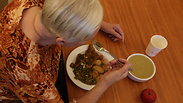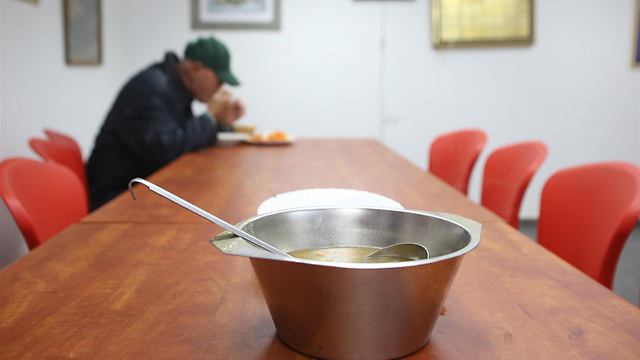
A soup kitchen
צילום: גיל יוחנן
Soup kitchens feeding Holocaust survivors at risk of closure
Claims Conference stops funding for soup kitchens in second half of 2015, demanding Welfare Ministry to ensure their aid goes solely to Holocaust survivors.
The Claims Conference decided to stop funding dozens of soup kitchens that feed thousands of Holocaust survivors, leaving the facilities in danger of closing down, Ynet has learned.
The Claims Conference allocates millions of shekels a year to soup kitchens, which are run by NGOs supervised by the Welfare Ministry.
Earlier this month, dozens of soup kitchens received a letter from the Welfare Ministry saying the budget allocated by the Claims Conference for the second half of 2015 was not approved. As a result, there will be a "reevaluation" of the entire project.
"We only get scraps from the Welfare Ministry, small sums of money to operate one soup kitchen - some NIS 9,000 per year," said Rabbi Jacob Gloiberman, the director of the Hand in Hand Association.
"Our soup kitchen provides 72,000 meals a year at the cost of some NIS 600,000 and is under the supervision of the Health and Welfare Ministries. From the Claims Conference we received in the past over NIS 200,000 every year, and the majority of our budget is based on that funding," he added.
Rabbi Gloiberman said the decision to stop the funding would lead to "a complete eradication of the soup kitchens. We service 150 Holocaust survivors a day. What am I to tell these people now? We will have to close the soup kitchen without that aid. This was holy work the Claims Conference was doing because the state neglected that issue."
Rabbi Mendi Blau, director of Colel Chabad in Israel, which operates 23 soup kitchens servicing Holocaust survivors, stressed that "this will cause at least 20 soup kitchens all over the country to close their doors. It's not a massive sum, but it's the only money supporting these programs."
Blau said the survivors that frequent the soup kitchens will be left with no other place to go. "This is the neediest population," he said. "Second-tier Holocaust survivors who emigrated from the former Soviet Union are at the very bottom. They live without a pension, only off benefits. This is a disaster for these people: On the nutritional level - this is where they get their only hot meal a day; and on the social level - these are people who only leave the house to go to the soup kitchen."
The Claims Conference, also known as the Conference on Jewish Material Claims Against Germany, is a Jewish American non-profit organization that brings together representatives of Jewish organizations from all over the world.
The organization negotiates compensation for Holocaust survivors from the German government in an effort to return property to the Nazis' victims and their heirs and to aid the survivors who are still alive.
The organization, founded in 1951, employees people in Israel, the US and Germany, and runs projects in some 30 countries. In Israel, the organization supports different projects and organizations working for the benefit of Holocaust survivors.
The Claims Conference said in response, "The Claims Conference allocated some NIS 7 million for food services to survivors in 2016, an identical sum to the previous year. We are in the midst of a process of consultations with the Welfare Ministry, which supervises the issue of food security to the needy, in an effort to develop a mechanism that would ensure the money from the Claims Conference is used to aid only Holocaust survivors. In order to ensure the Claims Conference's support aids only needy Holocaust survivors, we are subject to supervision and monitoring mechanisms."
The Claims Conference further said that "in the beginning of 2015, the Claims Conference allocated funds to feed Holocaust survivors for the first half of the year, while clarifying to all of the NGOs and to the Welfare Ministry that it will no longer be able to continue funding this activity if there are no mechanisms ensuring the aid is given solely to Holocaust survivors."











